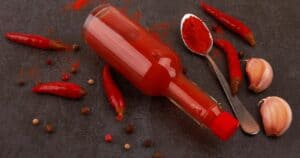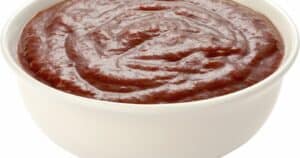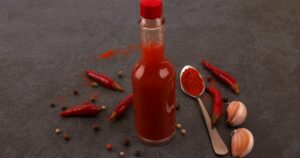Do you love adding a kick of heat and flavor to your meals with hot sauce? If you’re like many
The short answer is, it’s very unlikely hot sauce alone will kill you. However, dousing all your dishes in it or consuming extremely spicy varieties can lead to some nasty side effects. We’ll break down the health pros and cons, so you can make informed choices about how much heat is too much.
First, let’s look at the potential positives. The active ingredient capsaicin has been shown to temporarily increase your metabolism and reduce your appetite. Other research indicates it may help lower blood pressure and cholesterol. So enjoying hot sauce in moderation as part of an overall healthy diet can be beneficial.
However, certain health risks are associated with overdoing it. Too much sodium from certain sauces can raise blood pressure. Some very spicy sauces may irritate digestive conditions like IBS or acid reflux. And in rare cases, people have had allergic reactions.
The bottom line? While hot sauce won’t directly end your life, listening to your body’s signals is key. If you experience any adverse effects like consistent indigestion, it’s smart to cut back or choose milder varieties. Moderation and paying attention to ingredients is the best policy for staying safe while satisfying your craving for heat.
Now let’s explore more specific facts on the health effects of hot sauce…
Let’s Break Down the Pros and Cons of Hot Sauce for Your Health
Capsaicin, the active compound that gives chili peppers their heat, offers some science-backed benefits when consumed in moderation. But it can also have negative effects if you go overboard. Here’s what the research shows:
Potential Benefits of Hot Sauce
- Increased metabolism and fat burning: Studies show capsaicin can provide a temporary boost to metabolism, increasing fat oxidation. This effect is most noticeable for those not accustomed to spicy foods.
- Reduced appetite: Capsaicin may curb appetite and reduce calorie intake during a meal. The spiciness also slows eating, which could lead to consuming fewer calories.
- Lower blood pressure: Some research indicates daily consumption of chili peppers and capsaicin can lower blood pressure levels in certain groups, reducing hypertension risk.
- Anti-inflammatory effects: Capsaicin has demonstrated anti-inflammatory properties. Consuming it regularly may help reduce inflammation-related conditions.
- Lower cholesterol: Animal studies found capsaicin intake reduced LDL (bad) cholesterol and increased HDL (good) cholesterol. This could lower risks for heart disease.
Potential Side Effects of Too Much Hot Sauce
- Digestive issues: In some people, large amounts of capsaicin can irritate the digestive tract, exacerbating conditions like IBS, frequent heartburn, or sensitive stomachs.
- High sodium intake: Many hot sauces are high in sodium, which could contribute to high blood pressure. Those with hypertension or at risk for it should limit sodium.
- Stomach pain and cramping: Overdoing the heat can cause temporary burning sensations, stomach aches, and cramping in some individuals. Staying hydrated helps avoid this.
- Allergic reaction: Rarely, those allergic to chili peppers/capsaicin could experience hives, itching, or swelling from hot sauce.
The Dose Makes the Poison: Moderation Is Key
Capsaicin is not directly toxic or deadly except in massive doses. But as with most foods, moderation is ideal for health and safety. Consuming reasonable amounts of hot sauce as part of a normal diet is unlikely to cause harm.
However, doses of capsaicin at over 2.5-5mg could potentially start to have negative effects for some. Very hot sauces are concentrated sources, making it easier to go overboard.
Those eating extreme quantities of pure capsaicin crystals or extracts would be most at risk. The human tolerance limit for capsaicin is around 15-25mg. Above this range, you could experience more severe burning, vomiting, abdominal pain or rarely, chemical burns.
The bottom line: it would take a very large dose of purified capsaicin to potentially be life-threatening. For regular hot sauce, toxicity is extremely unlikely.
Who Should Be Cautious with Spicy Foods?
While most people can safely enjoy hot sauce, certain individuals more sensitive to its effects should exercise moderation and caution:
- Those with digestive disorders like IBS, GERD, ulcers, or frequent heartburn may experience more irritation of symptoms from spicy foods.
- People taking blood pressure medications or with hypertension concerns should limit sodium intake from sauces.
- Anyone with allergies/intolerances to chili peppers or their compounds should avoid hot sauce due to risks like anaphylaxis.
- Children may be more sensitive to spiciness – caution is advised when giving hot sauce.
For those at higher risk of adverse effects, avoiding super-hot sauces is wise. Milder varieties or small amounts of hot sauces are safer options.
Tips for Safely Enjoying Hot Sauce
Luckily, it’s easy to incorporate hot sauce into your diet in moderation so you can enjoy the benefits while avoiding potential downsides:
- Read labels – Choose sauces lower in sodium, especially if you have blood pressure concerns. Avoid extreme heat levels.
- Start slow – If new to spicy foods, build up your tolerance gradually.
- Use sparingly – Add small dashes or drops while cooking or at the table, instead of pouring from the bottle.
- Stay hydrated – Drink plenty of fluids to avoid digestive irritation and overheating.
- Listen to your body – Reduce spicy foods if you experience any consistent discomfort or adverse effects.
- Buy quality – Seek out high-quality, reputable hot sauce brands using natural ingredients.
The Bottom Line – Can Hot Sauce Kill You?
It’s highly unlikely consuming hot sauce would directly kill or seriously harm most people. But as with any food, there are some risks associated with overdoing it – especially for those with certain medical conditions.
Practicing moderation, choosing quality products, reading labels, and listening to your body’s reactions are smart precautions. Pairing hot sauce with an overall healthy diet and lifestyle lets you safely reap the tasty benefits of chili peppers, without going overboard on the heat.
So go ahead and enjoy your favorite spicy condiment, but apply it with prudence. With reasonable and mindful use, you can
FAQs
What makes hot sauce potentially dangerous in large amounts?
The active compound in hot peppers that gives them heat and
How much hot sauce would it take to seriously harm or kill someone?
For the average person, it would be extremely difficult to fatally harm yourself with regular hot sauce alone. Even drinking an entire bottle at once is unlikely to kill you. To ingest potentially deadly amounts of capsaicin, you would have to consume multiple grams of pure capsaicin extract, which is unrealistic through normal culinary uses of hot sauce.
Are certain groups more sensitive to hot sauce?
Yes, people with digestive disorders like IBS or GERD may experience more irritation from spicy foods. Those taking blood pressure medication or with hypertension also need to limit sodium from hot sauces. Anyone allergic to chili peppers should also avoid hot sauces. Children can be more sensitive as well.
What tips can you provide for safely enjoying hot sauce?
Start slowly if new to spicy foods, use hot sauce sparingly, drink plenty of fluids, choose sauces with lower sodium, avoid extreme heat levels, listen to your body, and reduce or avoid spicy foods if you experience discomfort or reactions. Also, buy reputable brands using natural ingredients.
Can you build up a tolerance to hot sauce over time?
Yes, regularly eating spicy foods can help build up a tolerance over time by slowly increasing your exposure to capsaicin. This can decrease sensitivity. But always start slowly and avoid overdoing it. Those with conditions exacerbated by





